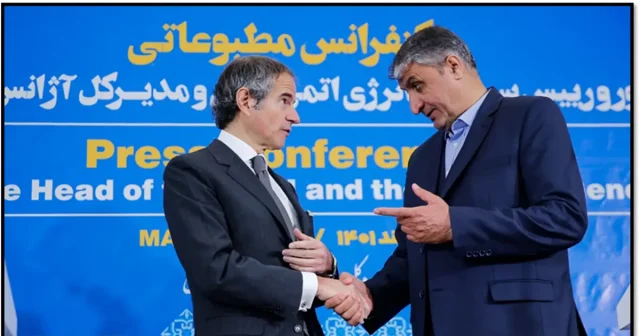Analysts in Iran have expressed conflicting reactions to the UN nuclear chief Rafael Grossi’s recent visit, while President Ebrahim Raisi responded by repeating Tehran’s “revolutionary” rhetoric.
Pro-government Faraz daily website in Tehranhas expressed optimism about IAEA Chief Rafael Grossi’s recent visit, suggesting it eased some tensions between Iran, the United States, and Western countries in general. The website hopes the visit will positively influence the revival of negotiations between the West and Iran.
In an interview with the same website, international relations expert Abdolreza Faraji-Rad remarked that Grossi had intended to visit Tehran for several months, but regional tensions and the conflict in Gaza delayed his trip. Faraji Rad implied that Iran’s involvement in these events hindered Grossi’s visit.
According to Faraji-Rad, during a meeting in Isfahan, Grossi and Iranian officials agreed to discuss three specific issues in their future meetings, though he did not disclose what these issues were. The talks in Esfahan thus far have yielded no concrete results. He cited Grossi stating that the IAEA hopes for Iran’s cooperation in the upcoming meeting.
Faraji-Rad characterized Grossi’s statement as both a carrot and a stick approach: cooperation from Iran could prevent the agency from issuing a resolution against it, but non-cooperation might lead to such a resolution and potentially trigger a snapback of sanctions. Despite these complexities, he noted that Grossi’s visit generally helped to calm the situation temporarily.
When asked about potential impacts on the 2015 nuclear deal with Iran (JCPOA), Faraji remarked, “Iran still maintains that it has not withdrawn from the JCPOA, though it is now enriching uranium to 60 percent purity, well above the agreement’s cap of 67.3 percent. This complicates any further agreement, but change remains possible.”
He also revealed that behind-the-scenes discussions with the U.S. have urged Iran to return to the agreed enrichment level, especially as the U.S. seeks to avoid escalating tensions ahead of its elections. Nevertheless, Faraji-Rad acknowledged that Iran’s involvement in the Gaza conflict has negatively impacted its relations with Western countries.
Analysts speaking to Iran International TV have speculated that Grossi’s visit to Iran would not have occurred without approval from Washington.
Meanwhile, another foreign policy analyst, the former chief of the Iranian parliament’s Foreign Policy Committee, Heshmatollah Falahatpishjeh told Rouydad24 website that the United States has kept the door open to negotiations over the nuclear issue. He added that the current stable oil prices in international markets are working in favor of the United States.
Speaking sarcastically about Grossi’s visit, Falahatpisheh said that “Grossi did not bring anything back from Iran other than a box of Gaz,” a popular nougat-like Persian delight.
Meanwhile, contradicting Faraji-Rad’s comments about Iran and the JCPOA, Falahatpisheh asserted that Iran is adhering to its commitments under the JCPOA, though it has not politically benefited from the deal. He dismissed the visit as mere protocol, adding that the Iranian government is attempting to portray this unproductive visit as an achievement to maintain the appearance of engagement with the JCPOA. “The only path forward for the JCPOA is towards collapse,” he stated.
On the other hand, Iran’s President Ebrahim Raisi reiterated his dated revolutionary rhetoric concerning the 2015 nuclear deal, indicating that Iran’s leadership, particularly Supreme Leader Ali Khamenei, harbors mixed feelings about the JCPOA. He appears to dislike the agreement yet desires to reap its benefits. This ambivalence keeps the United States and Europe in a state of uncertainty, oscillating between moments of optimism about reaching an agreement and times when all hopes seem to diminish.
Raisi said that his predecessor President Hassan Rouhani wanted to impose JCPOA 2 and JCPOA 3 on the nation, but Supreme Leader Ali Khamenei objected and faced down the enemies in the same way he did in the recent missile attack on Israel. Mindless of the fact that what he said did not make perfect sense, he said: “Our rhetoric is about revolutionary rationalism, not about a diplomacy of begging.”






















